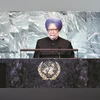Dr Manmohan Singh passed away on December 26, and his loss has inspired a wide range of tributes for a political leader distinguished by his integrity, humility, deep understanding of the economy, and achievements as both finance minister and long-standing Prime Minister.
He grew up in a poor family in Punjab and was, I think, the first person in his family to attend university and scholarship supported higher education in the UK. He had an extraordinary working life as an academic and a bureaucrat, but his most significant national contributions came during his tenure as the finance minister under Narasimha Rao and later as the prime minister by the Congress Party at the suggestion of Sonia Gandhi.
I first met him in 1971, when he was serving as economic advisor in the Ministry of Commerce. He was an early advocate of India placing greater emphasis on export development, which is reflected in his 1962 DPhil thesis at Oxford and his later book India’s Export Trends and Prospects for Self-Sustained Growth. In some ways, this academic perspective is reflected in the path-breaking changes he engineered in July 1992.
His Budget presentation in 1992 marked a series of changes that liberalised controls and shifted the focus of investment from the public to the private sector. The elimination of industrial licensing, the gradual shifts of trade policy away from high tariffs and quantitative controls, the exchange rate changes, and the liberalisation of the financial system are behind the significant shift in the Indian economy compared to the pre-liberalisation era. The fact that he saw the revolutionary nature of the Budget was reflected in his statement at the end of his speech that “an idea whose time has come” is the emergence of India as a major economic power in the world.
Also Read
Dr Singh’s capacity to promote a policy idea that is not widely prevalent and supported in political and bureaucratic circles was also reflected in his diplomatically astute promotion of the nuclear agreement with the United States during his tenure as prime minister. This was a vital precondition for strengthening of relations with the preeminent global power, which he perhaps saw as crucial for India’s outward economic orientation and its geopolitical relations with China and Pakistan. He also tried a reorientation of India’s relations with Pakistan, but that did not work out, perhaps due to the political instability in Pakistan.
These two fundamental shifts in the trade orientation of economic policy and in the reorientation, perhaps partial still, of India’s diplomatic stance are today the foundation of the country’s long-term development plans. We must recognise the key role of the gentle and unassuming Dr Singh in achieving this.
There are many other achievements of his tenure as the prime minister that one can list. The period of rapid growth from 2004 to 2011 depended at least partially on Dr Singh’s good understanding of economic dynamics. I would also mention that two socially oriented initiatives during his tenure, the rural employment guarantee programme (MGNREGA) and the recognition of the citizen’s Right to Information (RTI) are the most welcome.
Dr Singh was very conscious of the fact that he had risen from a poor family to the highest levels of power, which shaped his view of his responsibilities. He had once said: “This country has honoured me by appointing me to some of the most important public offices of our sovereign Republic. This is a debt which I can never be able to fully repay. The best I can do is to pledge myself to serve our country with utmost sincerity and dedication.” He certainly did this and will be remembered for that.
While he was a prominent public citizen, Dr Singh was also a devoted husband and father. Even in his famous July 1992 speech, there was a light-hearted paragraph that proposed elimination of excise duties on tiffin boxes where he said: “I have had to spend long hours in office. This has quite naturally made my wife very unhappy. The House will agree that it is not good for the health of our economy if the Finance Minister of the country has strained relations with his own finance minister at home.”
My deepest condolences to his wife Gurcharan Kaur and to his three talented daughters Upendra, the historian; Daman, the writer; and Amrit, the human rights activist.
The writer is a former chief economic adviser in the Union finance ministry and a former under-secretary general at the UN. desaind@icloud.com
Disclaimer: These are personal views of the writer. They do not necessarily reflect the opinion of www.business-standard.com or the Business Standard newspaper

)